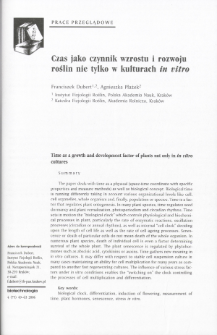- Search in all Repository
- Literature and maps
- Archeology
- Mills database
- Natural sciences
Advanced search
Advanced search
Advanced search
Advanced search
Advanced search

Object
Title: Czas jako czynnik wzrostu i rozwoju roślin nie tylko w kulturach in vitro
Subtitle:
Time as a growth and development factor of plants not only in in vitro cultures
Publisher:
Komitet Biotechnologii PAN ; Instytut Chemii Bioorganicznej PAN
Abstract:
The paper deals with time as a physical (space-time coordinate with specific properties and measure methods) as well as biological concept. Biological time is running differently taking in account various organizational levels like cell, cell organelles, whole organism and, finally, population or species. Time is a factor that regulates plant ontogenesis. In many plant species, time regulates seed dormancy and plant vernalization, photoperiodism and circadian rhythms. Time sets in motion the “biological clock” which controls physiological and biochemical processes in plant, particularly the rate of enzymatic reactions, oscillation processes (circadian or annual rhythms), as well as internal “cell clock” deciding upon the length of cell life as well as the rate of cell ageing processes. Senescence or death of particular cells do not mean death of the whole organism. In numerous plant species, death of individual cell is even a factor determining survival of the whole plant. The plant senescence is regulated by phytohormones such as abscisic acid, cytokinins or auxins. Time gathers new meaning in in vitro cultures. It may differ with respect to stable cell suspension culture in many cases maintaining an ability for cell multiplication for many years as compared to another fast regenerating cultures. The influence of various stress factors under in vitro conditions enables the “switching on” the clock controlling the processes of cell multiplication and differentiation.
Relation:
Biotechnologia, vol.75, 4 (2006)-.
Volume:
Issue:
Start page:
End page:
Detailed Resource Type:
Format:
Resource Identifier:
0860-7796 ; oai:rcin.org.pl:87228 ; IChB B-71
Source:
Biblioteka Instytutu Chemii Bioorganicznej PAN
Language:
Language of abstract:
Temporal coverage:
Rights:
Licencja Creative Commons Uznanie autorstwa-Na tych samych warunkach 4.0
Terms of use:
Digitizing institution:
Instytut Chemii Bioorganiczneji Polskiej Akademii Nauk
Original in:
Instytut Chemii Bioorganiczneji Polskiej Akademii Nauk
Projects co-financed by:
Access:
Object collections:
- Digital Repository of Scientific Institutes > Partners' collections > Institute of Bioorganic Chemistry PAS > Articles
- Digital Repository of Scientific Institutes > Literature > Journals/Articles
Last modified:
Oct 2, 2020
In our library since:
Dec 7, 2019
Number of object content downloads / hits:
620
All available object's versions:
https://rcin.org.pl./publication/113706
Show description in RDF format:
Show description in RDFa format:
Show description in OAI-PMH format:
| Edition name | Date |
|---|---|
| Czas jako czynnik wzrostu i rozwoju roślin nie tylko w kulturach in vitro | Oct 2, 2020 |
Objects Similar
Borkowska, Bożenna
Ziółkowski, Piotr Babula- Skowrońska, Danuta Kaczmarek, Małgorzata Cieśla, Agata Sadowski, Jan
Nowak, Jacek K.

 INSTYTUT ARCHEOLOGII I ETNOLOGII POLSKIEJ AKADEMII NAUK
INSTYTUT ARCHEOLOGII I ETNOLOGII POLSKIEJ AKADEMII NAUK
 INSTYTUT BADAŃ LITERACKICH POLSKIEJ AKADEMII NAUK
INSTYTUT BADAŃ LITERACKICH POLSKIEJ AKADEMII NAUK
 INSTYTUT BADAWCZY LEŚNICTWA
INSTYTUT BADAWCZY LEŚNICTWA
 INSTYTUT BIOLOGII DOŚWIADCZALNEJ IM. MARCELEGO NENCKIEGO POLSKIEJ AKADEMII NAUK
INSTYTUT BIOLOGII DOŚWIADCZALNEJ IM. MARCELEGO NENCKIEGO POLSKIEJ AKADEMII NAUK
 INSTYTUT BIOLOGII SSAKÓW POLSKIEJ AKADEMII NAUK
INSTYTUT BIOLOGII SSAKÓW POLSKIEJ AKADEMII NAUK
 INSTYTUT CHEMII FIZYCZNEJ PAN
INSTYTUT CHEMII FIZYCZNEJ PAN
 INSTYTUT CHEMII ORGANICZNEJ PAN
INSTYTUT CHEMII ORGANICZNEJ PAN
 INSTYTUT FILOZOFII I SOCJOLOGII PAN
INSTYTUT FILOZOFII I SOCJOLOGII PAN
 INSTYTUT GEOGRAFII I PRZESTRZENNEGO ZAGOSPODAROWANIA PAN
INSTYTUT GEOGRAFII I PRZESTRZENNEGO ZAGOSPODAROWANIA PAN
 INSTYTUT HISTORII im. TADEUSZA MANTEUFFLA POLSKIEJ AKADEMII NAUK
INSTYTUT HISTORII im. TADEUSZA MANTEUFFLA POLSKIEJ AKADEMII NAUK
 INSTYTUT JĘZYKA POLSKIEGO POLSKIEJ AKADEMII NAUK
INSTYTUT JĘZYKA POLSKIEGO POLSKIEJ AKADEMII NAUK
 INSTYTUT MATEMATYCZNY PAN
INSTYTUT MATEMATYCZNY PAN
 INSTYTUT MEDYCYNY DOŚWIADCZALNEJ I KLINICZNEJ IM.MIROSŁAWA MOSSAKOWSKIEGO POLSKIEJ AKADEMII NAUK
INSTYTUT MEDYCYNY DOŚWIADCZALNEJ I KLINICZNEJ IM.MIROSŁAWA MOSSAKOWSKIEGO POLSKIEJ AKADEMII NAUK
 INSTYTUT PODSTAWOWYCH PROBLEMÓW TECHNIKI PAN
INSTYTUT PODSTAWOWYCH PROBLEMÓW TECHNIKI PAN
 INSTYTUT SLAWISTYKI PAN
INSTYTUT SLAWISTYKI PAN
 SIEĆ BADAWCZA ŁUKASIEWICZ - INSTYTUT TECHNOLOGII MATERIAŁÓW ELEKTRONICZNYCH
SIEĆ BADAWCZA ŁUKASIEWICZ - INSTYTUT TECHNOLOGII MATERIAŁÓW ELEKTRONICZNYCH
 MUZEUM I INSTYTUT ZOOLOGII POLSKIEJ AKADEMII NAUK
MUZEUM I INSTYTUT ZOOLOGII POLSKIEJ AKADEMII NAUK
 INSTYTUT BADAŃ SYSTEMOWYCH PAN
INSTYTUT BADAŃ SYSTEMOWYCH PAN
 INSTYTUT BOTANIKI IM. WŁADYSŁAWA SZAFERA POLSKIEJ AKADEMII NAUK
INSTYTUT BOTANIKI IM. WŁADYSŁAWA SZAFERA POLSKIEJ AKADEMII NAUK


































